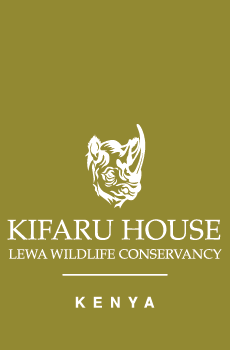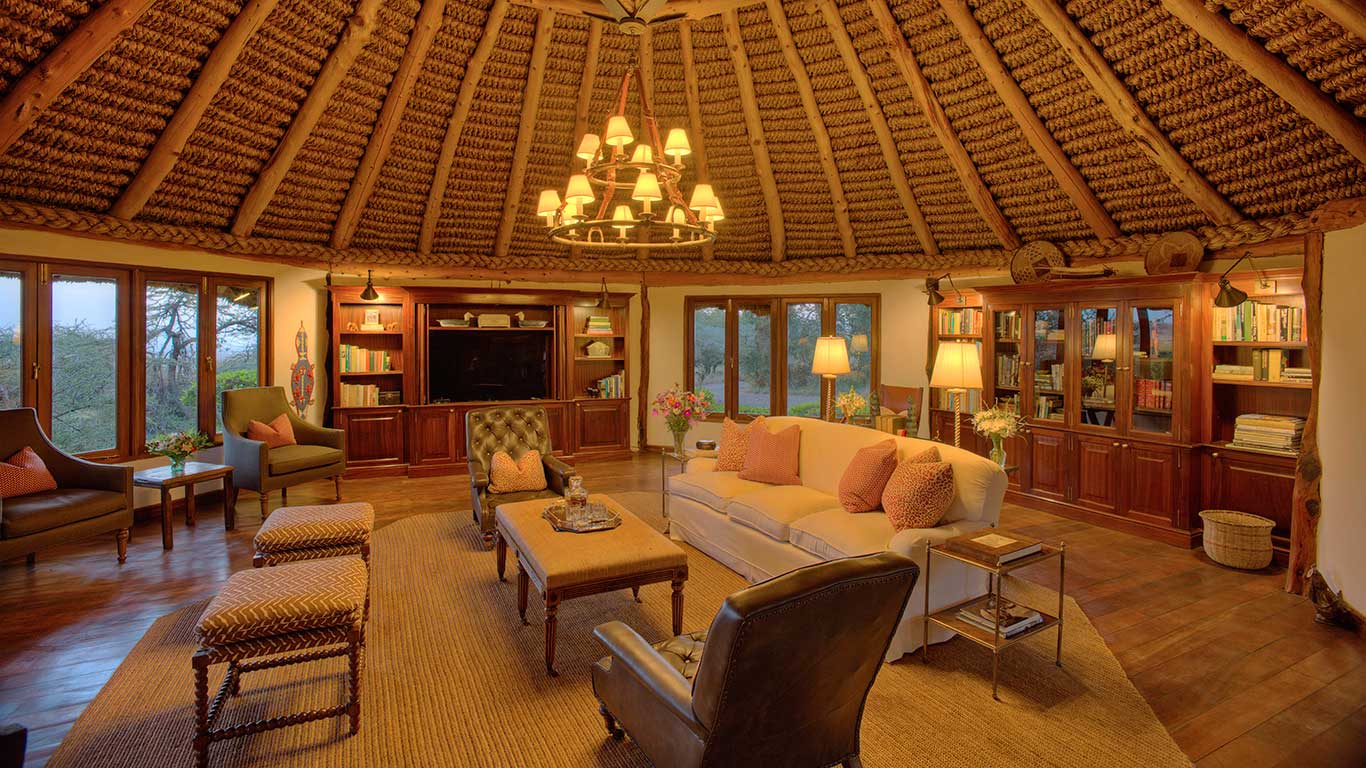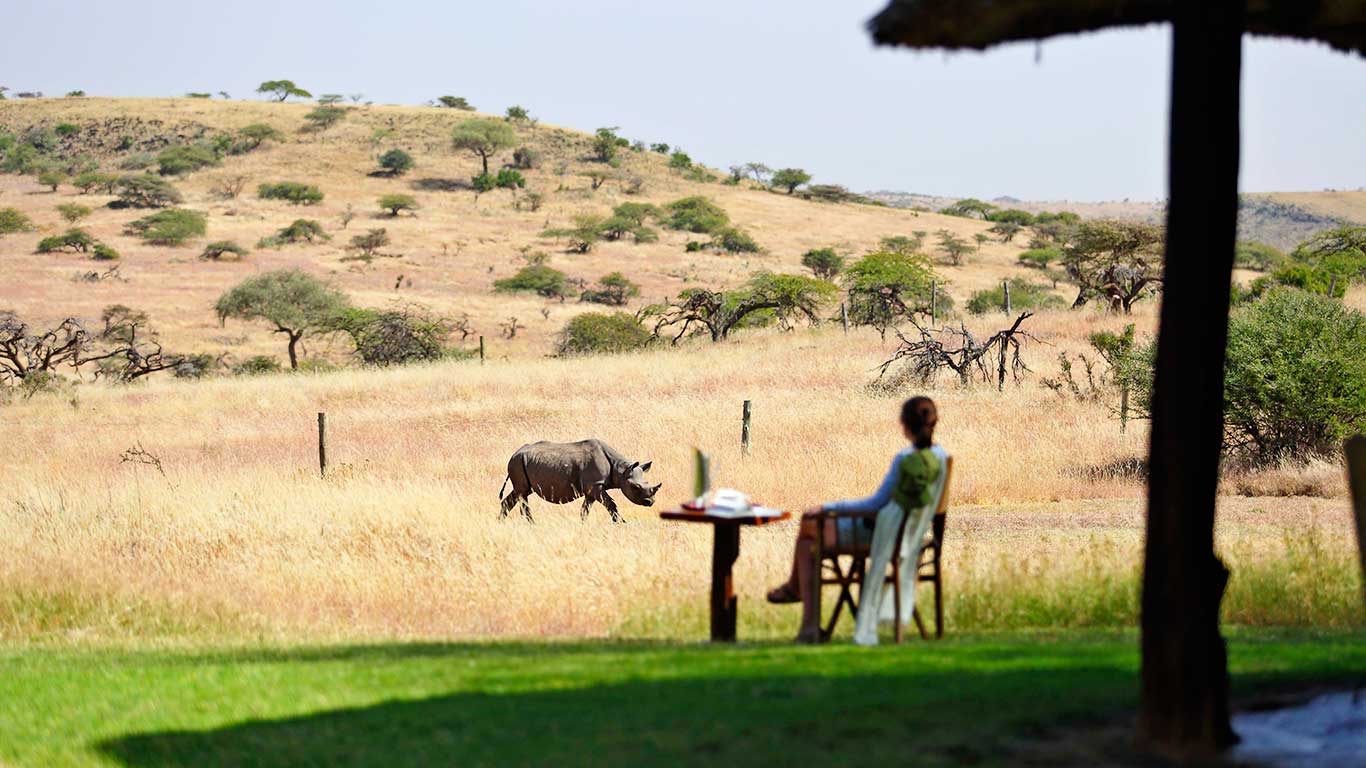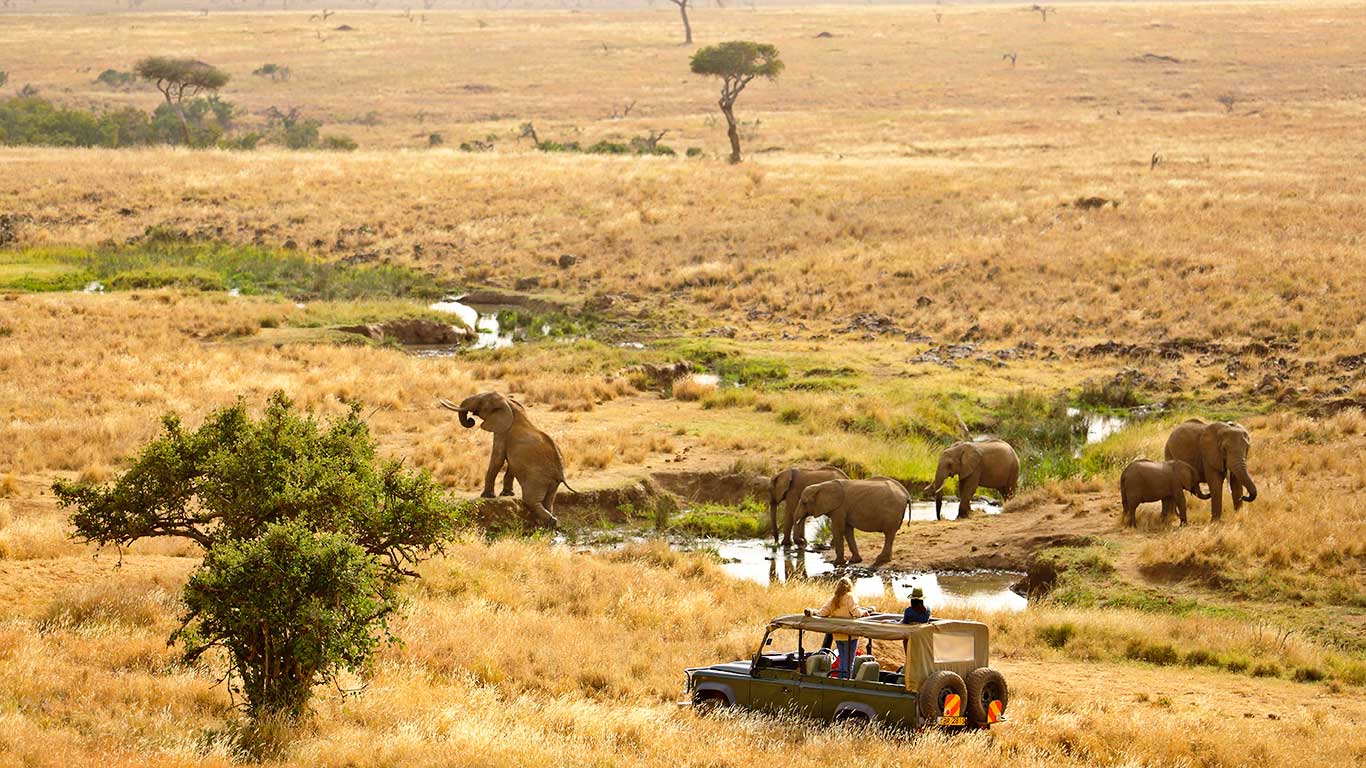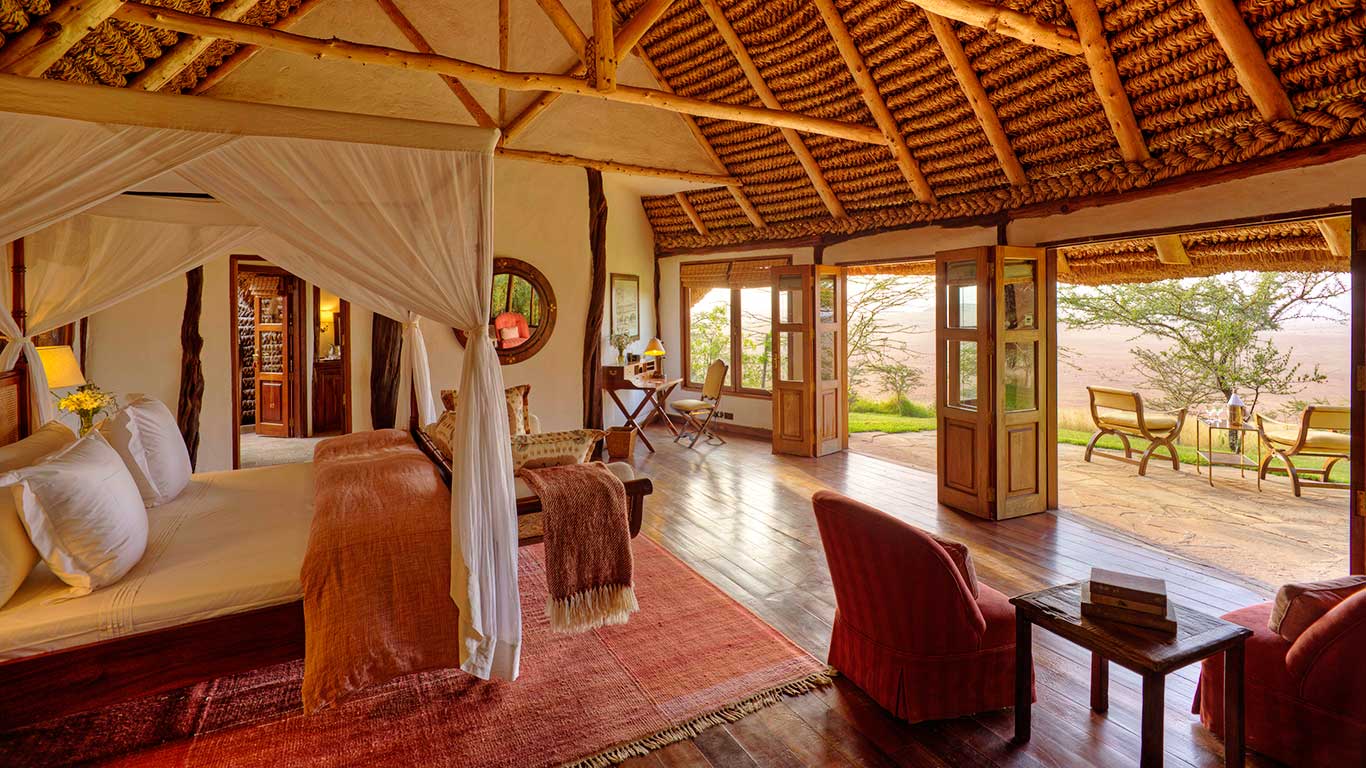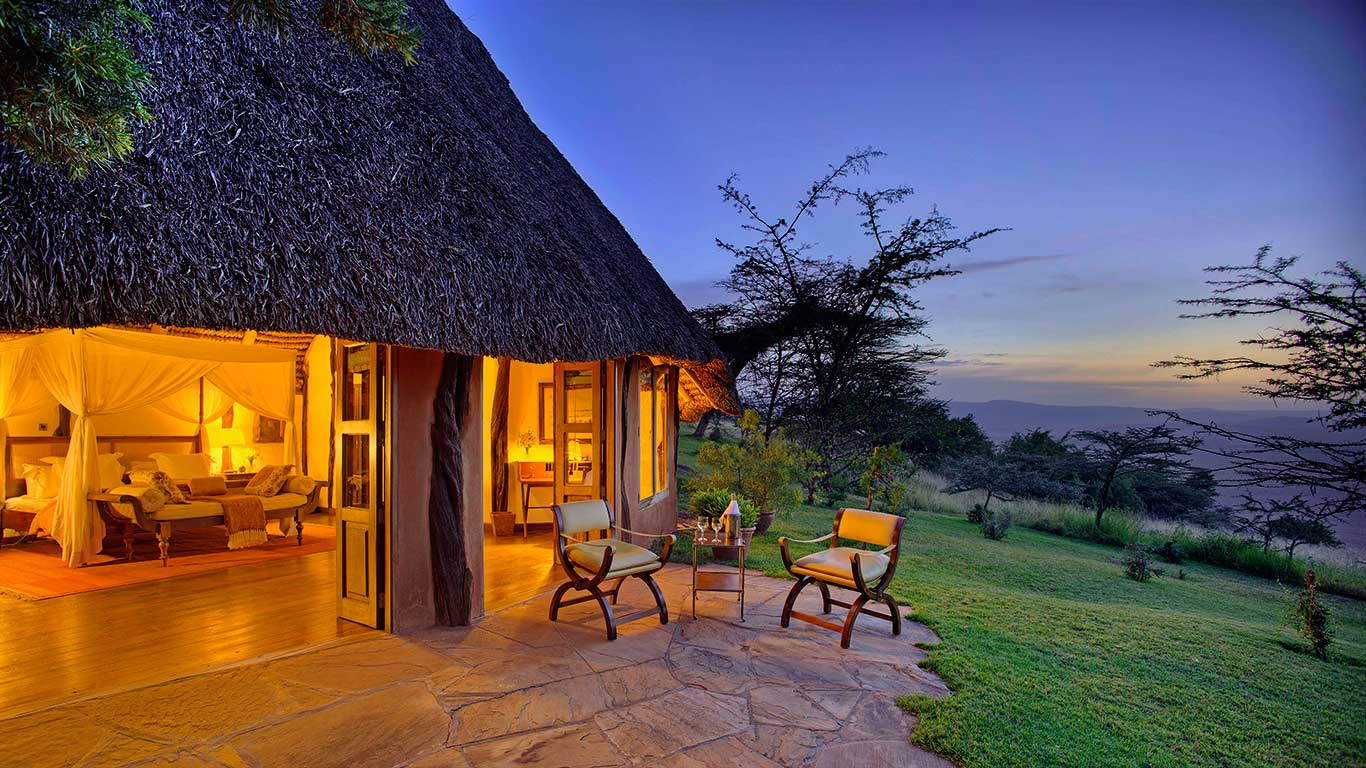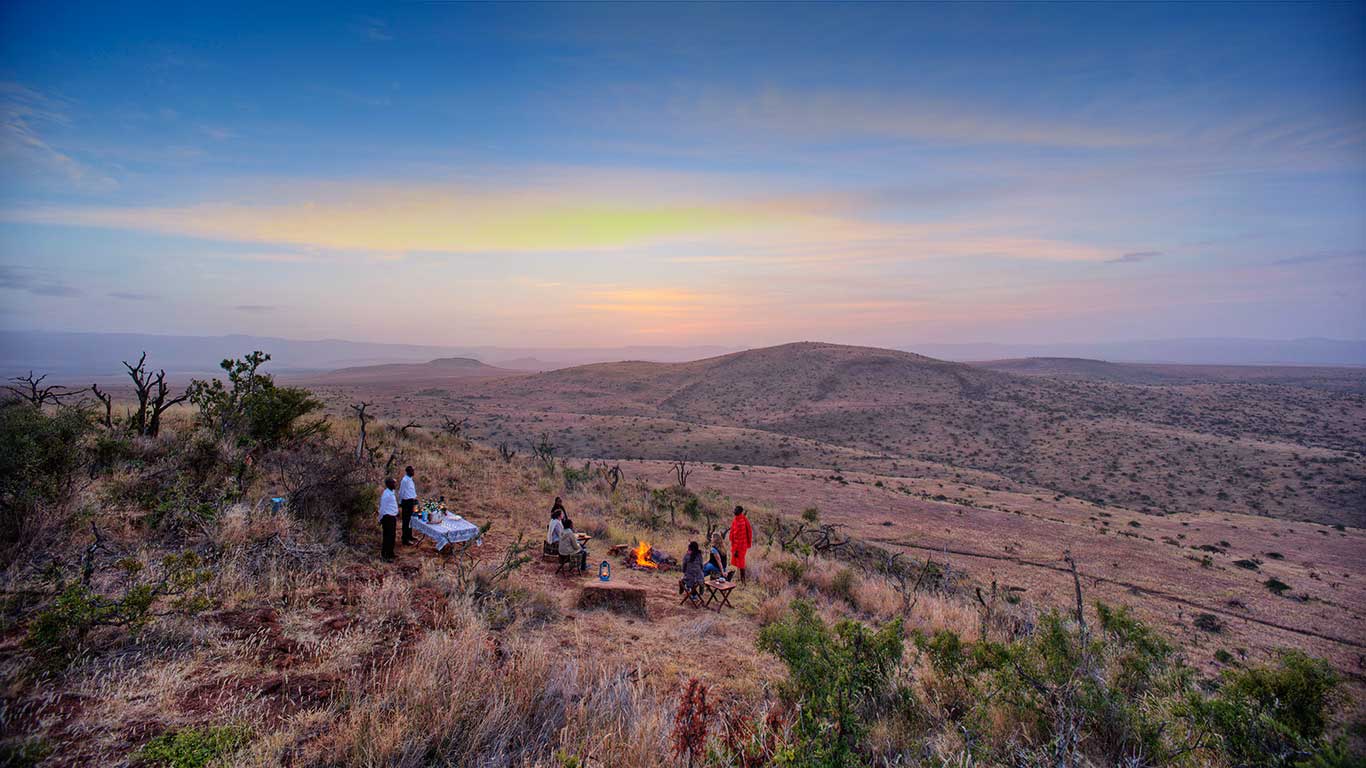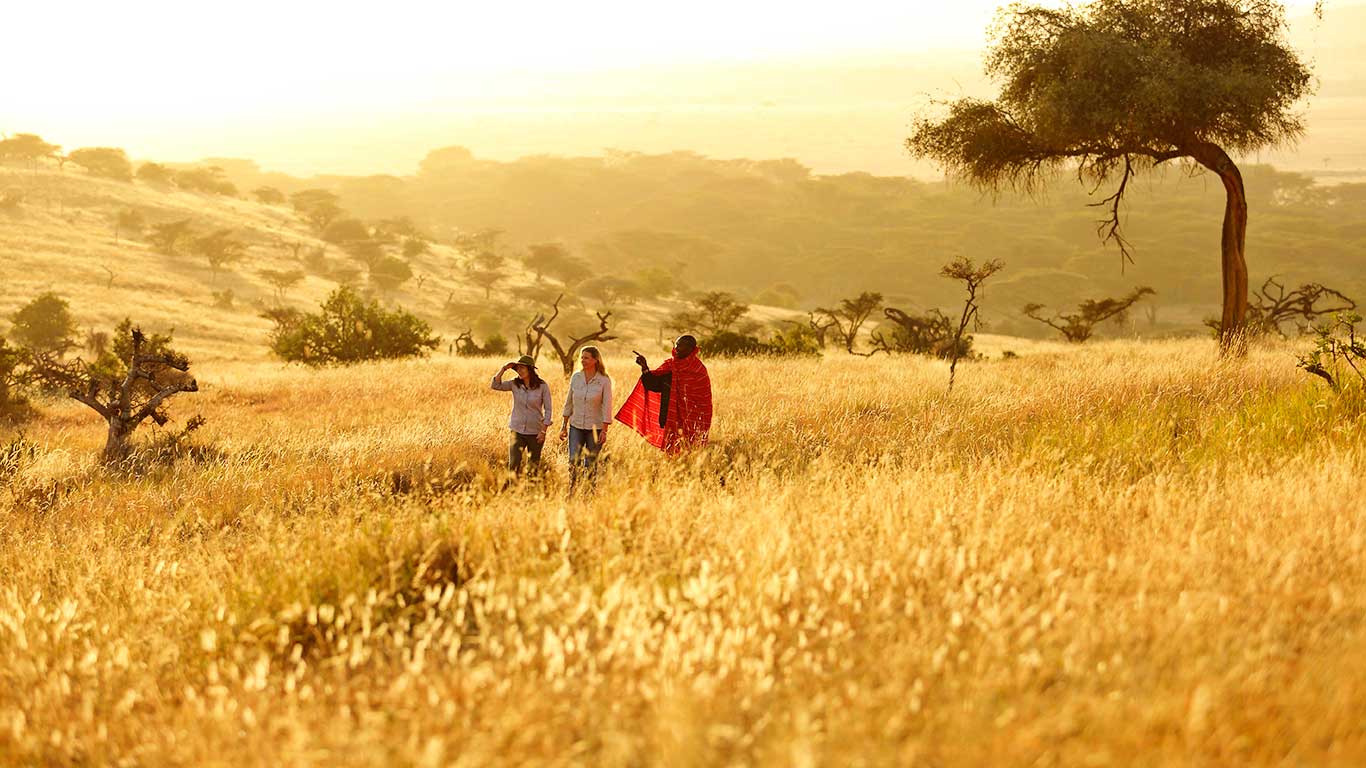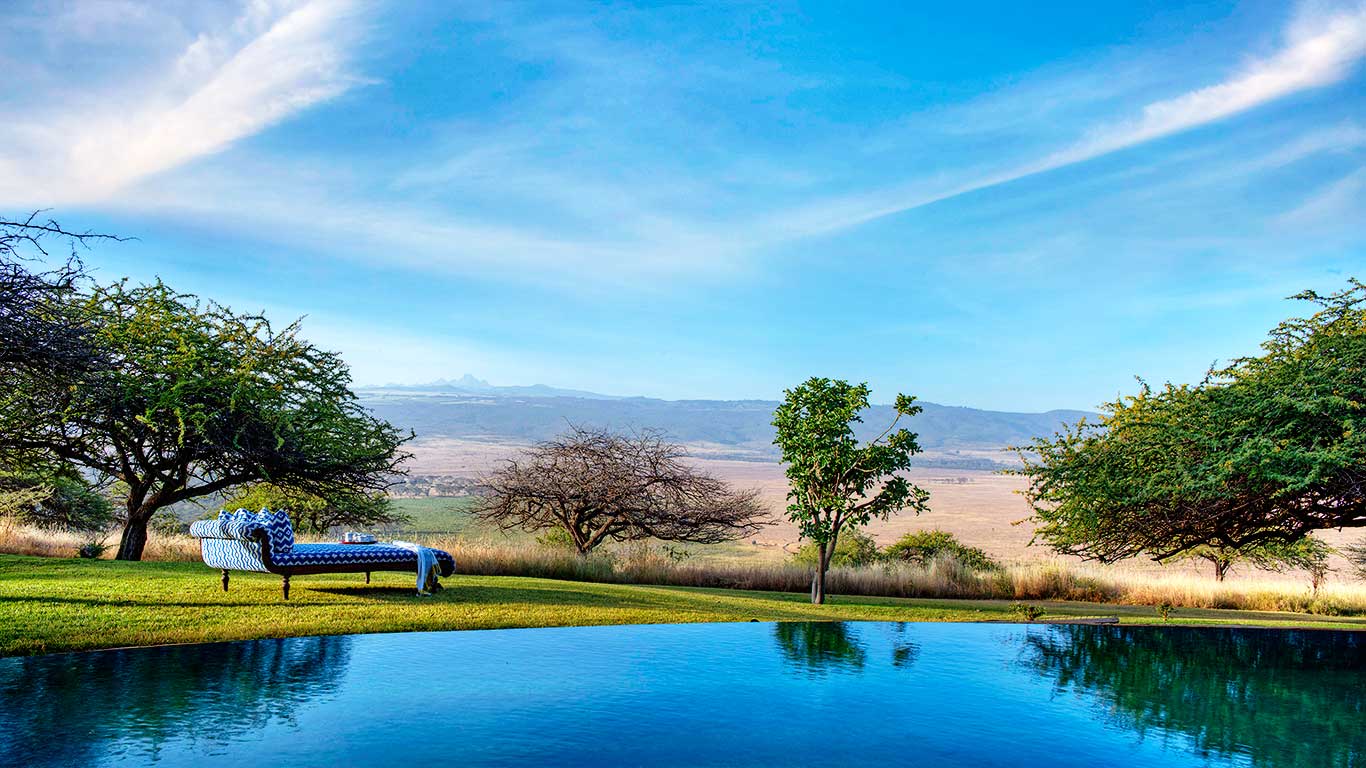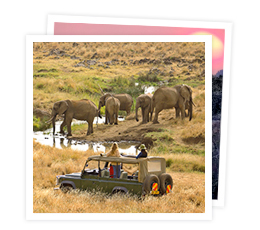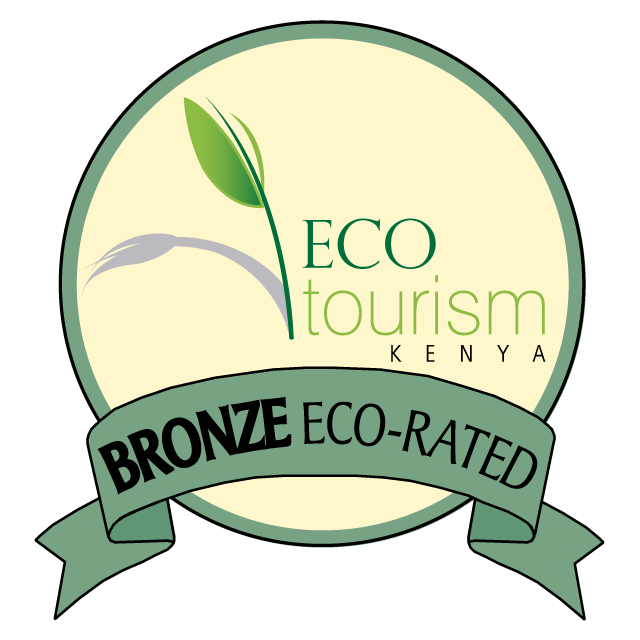Conservation
Lewa Wildlife Conservancy was previously a cattle ranch owned by David and Delia Craig, who together with Ana Mertz and Peter Jenkins, initially set aside 5,000 acres to protect and breed rhinos, whose population had dropped precipitously from 20,000 to less than 300 in the 1970′s. Within a decade, the success of the project drove demand for more space and, in 1995, the Craigs decided to dedicate their entire ranch to the conservation of wildlife.
Lewa has served as a catalyst for conservation across the region, stimulating the creation of numerous conservancies, both private and community-owned, increasing the amount of land under conservation management in northern Kenya to over almost 2 million acres since the mid-1990s.
Anti-Poaching Team
Lewa Conservancy and The Northern Rangelands Trust have a dedicated Anti-Poaching team built around the incredible tracking skills of Ruby, a full Bloodhound, and Sacha, a mix of a Dobermann and Bloodhound. Ruby and Sacha replace brothers Tipper and Tony, the two Bloodhounds that have worked with the rangers for years, but are due for a well earned retirement.
Tracker dogs, particularly Bloodhounds, continue to prove invaluable to anti-poaching and community security work. Their extraordinary ability to read terrain and track scents has enabled the rangers and local law enforcement agencies to do what was previously incredibly difficult.
Tipper and Tony have worked hard and the brothers’ have made it possible to catch poachers and other criminals, find illegal ivory, and rescue hundreds of stolen livestock in northern Kenya, saving many livestock farmers from bankruptcy. The retired Bloodhounds can relax and enjoy life in a good home, well cared for and pampered.
Rangers and dog handlers Aloise and Ngila are delighted with Ruby and Sacha and work together as a dedicated team in the field of conservation.
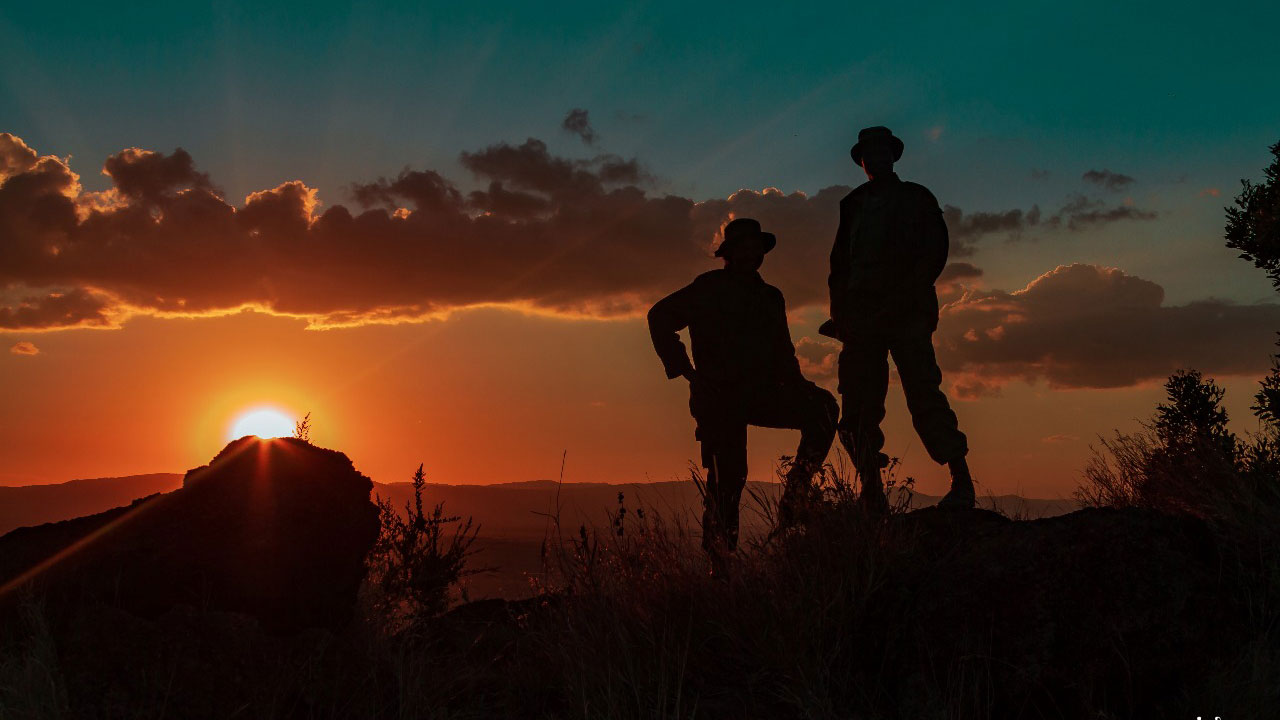
David Nkidedo
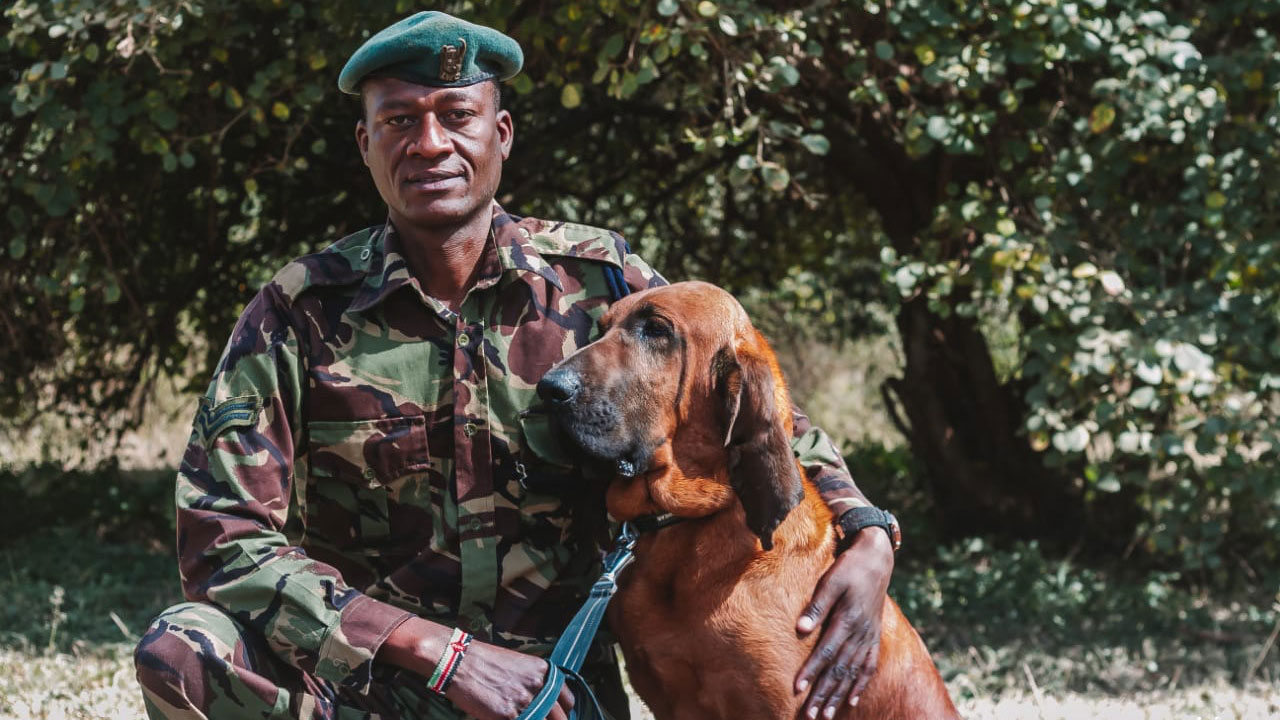
Meet David Nkidedo, a ranger with the Lewa Wildlife Conservancy in northern Kenya.
For the past four years, David has worked in Lewa’s Dog Unit.
This unit remains one of the anti-poaching team’s greatest assets. Consisting of four dogs and their handlers, the dogs act as efficient trackers, using the unique human scent to pursue suspects for lengthy distances, which wouldn’t be possible without the support of man’s best friend. Our tracker dog unit has been called upon across the country to support other anti-poaching efforts, including areas hundreds of kilometres away.
David’s favourite tracker dog is bloodhound Tipper, who is about to retire after years of service to conservation.
He spends long hours in the field, protecting endangered wildlife with his favourite playful and restless bloodhound with whom he has developed a strong bond over the years.
“I’m a father of four children, and I’m proud to work in safeguarding our natural heritage for generations to come,” he says.
Fridah Kinyanjui
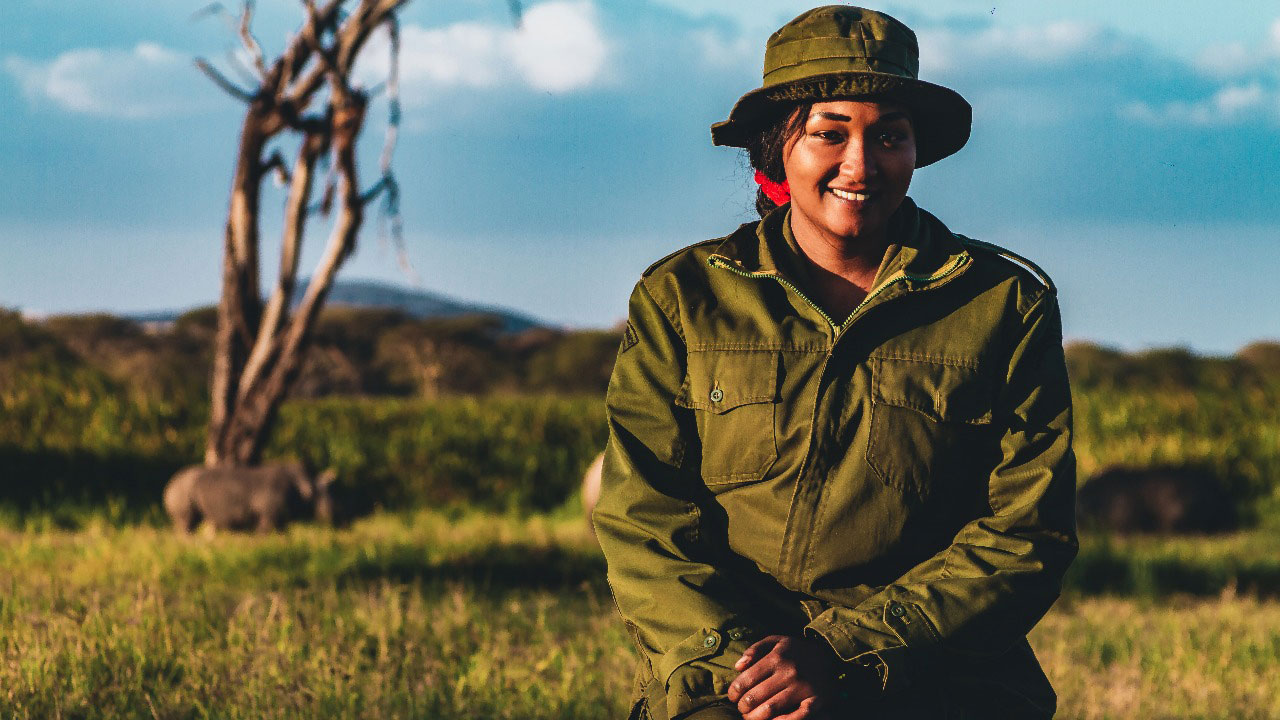
Fridah Kinyanjui, is proud to be a ranger in a traditionally male dominated field. She is also one of the youngest rangers on the Conservancy. She loves her green uniform and the sense of purpose that comes with being a ranger.
“I am still learning what it takes to protect wildlife. It’s not an easy job, but my father who was amongst the first rangers to work on Lewa, heavily influences me. He tells me how much things have changed from his time, but how the threat to our wildlife is still the same. He’s my role model, and I want to be like him. My father is also very popular and well respected on Lewa, and it makes me proud.”
Fridah says that the spirit of team work with her fellow rangers motivates her on a daily basis. She loves the good collaboration between radio operators, gatekeepers and the anti-poaching rangers.
Fridah would like to encourage more women to become rangers.
“It might look intimidating, but women can do it too, and do it very well.”
Joseph Piroris
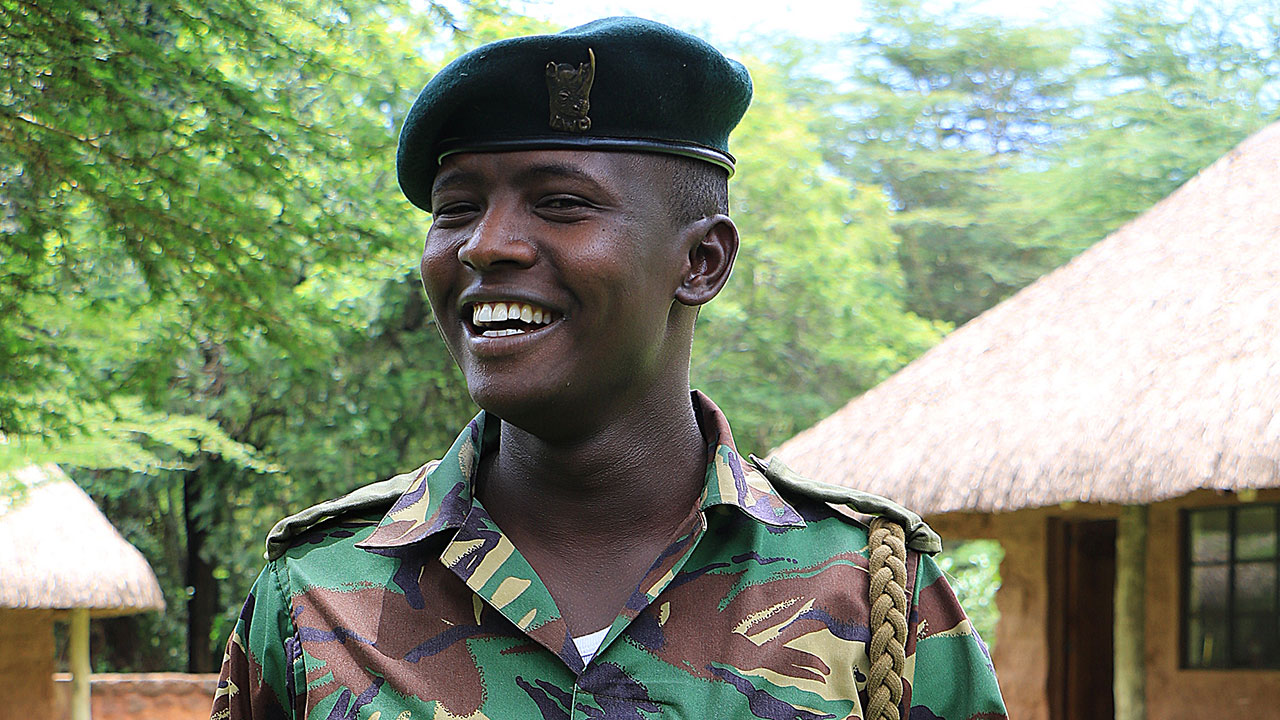
Joseph says that being a ranger for Lewa Wildlife Conservancy is more of a calling for him. He says: “Often, when I meet new people, the first thing they ask me is, what is it like to be a ranger? And why do you do what you do?
My answer is always simple. A ranger is a person. A son or a daughter, a brother or a sister, a mother or a father – a member of society. My father was a ranger for 21 years at Lewa, a part of the team that helped grow a small rhino population of just 15 animals to more than 150 today. Seeing the satisfaction that he got from his job, the sense of purpose, and that the job also enabled him to support my five siblings and I, made me want to be like him. I wanted to continue with his work and legacy.
Why do we rangers do what we do? Why do I do what I do? I realised that as Kenyans, we have a responsibility towards our wildlife and our natural areas. Most of us have never imagined a Kenya without our other wildlife – indeed, that would not be a true Kenya. Our wildlife is part of our identity, part of who we are as a people. I wanted to play a direct role in ensuring its survival. In the past six years I've been a ranger, our team has accomplished a lot.”
Patrick Munkai
Munkai has worked at the Conservancy for the past 21 years.
“I look forward to my work with a singular determination to be my best on a daily basis. Nothing brings satisfaction and joy in my work life such as playing an active role in protecting a variety of wildlife located in the conservancy. But what really makes a difference for me is that we not only protect wildlife, but also help to keep the people who neighbour us safe. I come from a neighbouring community, and I’ve gone home many times to help recover stolen livestock, or help a person who’s shop has been robbed. It makes me really proud to use my position to help our people.”
Munkai believes that its inherent that each and every one plays an integral role in ensuring we provide a safe home for our native plants and animals.
“It’s the least that we can give back for the sake of our future generations,” he says.
Mungai who describes himself as a dedicated family man loves spending time with his family during holidays.
Joseph Kathurima
Joseph Kathurima says he has no regrets since he joined the Lewa Wildlife Conservancy as a ranger two decades ago. He enjoys every minute he spends serving humanity by safeguarding endangered wildlife.
A day in the life of Kathurima means beginning work at the crack of dawn, which normally begins with daily patrols along the Conservancy.
“I’m a conservationist at heart. I feel strongly I was born to do this. People, land and wildlife all need each other to survive.,” he says.
His favourite animal is the black rhino, Lewa’s flagship species. He has seen the species numbers increase over the years, and is proud of the role he has played. He still doesn’t understand the need for rhino horn and ivory in the Far East, and hopes that this eventually changes for the sake of Africa’s wildlife.
Kathurima enjoys playing football with the Lewa football team during his past time.
Photo credits - Japicha
Managed by Elewana, Kifaru House and Lewa Safari Camp are the only two tourism properties owned by the Conservancy itself, with the aim of boosting the conservancy’s revenue through occupancy. The profits of each property and conservancy fees generated are reinvested directly into the conservation and community efforts of Lewa Wildlife Conservancy.
Sustainable tourism
Built mainly from materials sourced locally, great care has been taken to reflect the style, character and lifestyle of the Kenyan highlands and blend into the beautiful surroundings. Elewana Kifaru House has been built to have minimal environmental impact. Solar panels are used to generate electricity and heat water, waste water is recycled to irrigate the landscape including a lovingly tended organic kitchen garden.
Community
Through the facilitation of community conservation and development, protection of endangered species and education of neighbouring areas about the value of wildlife, Lewa Wildlife Conservancy has become Africa’s leading model for conservation and low impact tourism.
Being one of only two tourism properties that reinvest all profits into the Conservancy, when you visit Elewana Kifaru House, you inherently contribute to development support for thousands of people in the surrounding communities at the same time as securing a stable habitat for Kenya’s wildlife.
The essence of the community programmes is to reduce human-wildlife conflict and increase the socio-economic benefits local communities derive from wildlife and tourism. Lewa assists these communities with education and health-care support, water and agricultural projects, as well as a women’s micro-credit programme, reaching over 800 members.
Get Involved
Over and above the funding that Elewana Kifaru House generates for the Lewa Wildlife Conservancy projects, we are specifically encouraging additional donor support for the Conservancy’s Lewa Education Programme. The
programme supports 12 schools in the surrounding communities, providing classrooms, kitchens, teachers’ housing, a feeding programme reaching over 4,000 children, bursaries for over 500 students, assistance to 60 orphans, adult literacy catering for 300 people and conservation education running three times a week, open to students all over Kenya.
If you would like to visit one of the schools during your safari, a minimum $50 donation for the Lewa Education Programme will be applicable per person. Please note that the Lewa Education Programme allocates all donations received according to current priorities as identified by them. Contact us for more information.
If you would like to learn more about the Conservation work that Lewa Wildllife Conservancy does, a minimum $50 donation will be applicable per person to visit ongoing work. Participation depends on availability of conservancy personnel etc, but could include visiting the tracker dogs in their training, or a general discussion about the conservation work from those involved. Contact us for more information.
If you are considering bringing donations from abroad, visit the Pack for a Purpose website for very specific advice on what is needed. Please do note that when flying within Kenya, the internal flight weight restriction is 15kg and may therefore limit what you can carry with you to the camps and donate to the rural communities in person. We can always, however, donate anything over and above your weight limit on your behalf at a later date.

